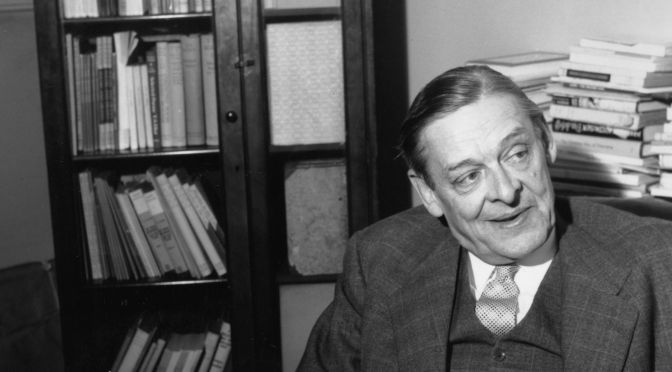T. S. Eliot in 1957 (Source: Getty Images)
I was taught poetry in elementary school from Memory Selections, a green-covered book that might have been an update of a 1903 imprint. I can still recite the first stanza of the first poem that I had to learn by heart, Christopher Morley’s “Song for a Little House”:
I’m glad our house is a little house,
Not too tall nor too wide;
I’m glad the hovering butterflies
Feel free to come inside.
Still with me, as well, are snippets of William Wordsworth’s “Daffodils” and Alfred Noyes’ “The Highwayman,” to mention two more. In high school, I came upon poets such as Emily Dickinson, W. H. Auden and T.S. Eliot, against whom I measure all others to this day.
Since my father wrote poems, both satirical and serious, and even my mother gave it the occasional go, it would not have been surprising to see me make some sort of an attempt, as well. I did compose a bit of verse as a teenager (a real fragment appears in my fictional story “Winter Wonderland”), but for most of my adult years I did not have the least bit of interest in either writing or reading the stuff.
Still, poetry must have remained right below the surface. When I started to write fiction, the first person that I pestered was poet Judith McCombs. She was kind enough to critique several drafts of “Making Soup,” the first story for which I received recognition and which I later had published. Another published story, “Winter Wonderland,” centered on Eliot’s remarkable poem “The Wasteland.”
These days, poet Clarinda Harriss reads most of my work, collaborates on some of my more outré efforts and, despite all that, somehow manages to remain a dear friend. She even inspired me to try my hand at poetry–of sorts–again. When I wanted to see if I could clarify what yet another story, “Take It,” was about, I turned it into a Shakespearean sonnet. And then unceremoniously tossed it.
So, while I have nothing of my own to show you right now, I suggest that you occasionally check this space for further developments.

I want to see that sonnet! Come on. It must be SOMEWHERE. As Socrates, or was it The Cars, said: Everything has to be someplace.
LikeLike
That sonnet is indeed dead. But since you’re one of the few who has read “Take It,” you could imagine it worked well, right down to the “turn.”
LikeLike
WELL, dammit, I hate waste. If it worked well, it can be reconstructed! Never waste a sonnet that worked well! (Yes, I can see how the volta would work.)
LikeLike